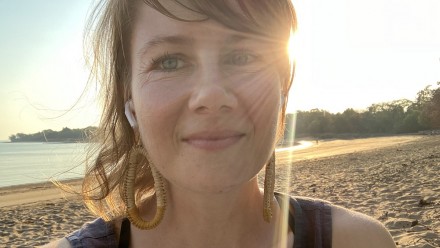Helping your neighbour. It's the rural way
From the time he was a student at ANU Medical School, Dr Nathan Oates knew he wanted to live and work rurally. Having grown up on a sheep farm in regional Victoria he wanted his own family to experience the same benefits he did as a child - a sense of community, a safe environment, fresh air and large open spaces.
For the past four and half years, Dr Oates has been able to realise that goal. He is currently an anaesthetist at South East Regional Hospital, Bega, where he is often involved with treating emergency and trauma patients. When he’s not working at the hospital, or at home with his four children, he’s often teaching the junior doctors or ANU medical students.
Before settling into life in the Bega Valley, Dr Oates undertook a fellowship with a British funded program in Zambia where he helped set-up an anaesthetic specialist training program for the developing country. He has also given time to the helicopter retrieval services where he provided critical care to accident patients. His interest in trauma medicine started in 2012, during his anaesthetic specialist training at The Canberra Hospital.
All this experience was put to good use when Dr Oates helped the hospital prepare its critical care services for patients affected by the bushfires.
“The Bega Valley fires had a huge impact on our community. In the early stages we were cut off from the outside world twice. Not only did we have the local population to consider during this time, there were also tens of thousands of tourists in various evacuations centres across the south coast. There were a number of patients that presented to our hospital that would usually have required immediate transfer to a tertiary hospital. We had to manage them locally until transport was an option”
“I’m not sure people are aware that in a small community like Bega, local emergency services (with the exception of the ambulance and police force) are primarily run by volunteers.”
“Before the Bega Valley was cut off for a second time we had a day and half to get organised.”
“One of the most important principles for any crisis or emergency is planning.”
“We assessed our requirements and in a day and a half were able to increase our capacity to manage a variety of different situations. This included setting up the emergency department to rapidly triage and manage burns victims in the event of a mass burns scenario. We set up a temporary operating theatre in the emergency department. We also brought in stocks of blood and essential medications to increase our ability to manage severe trauma, and to care for patients in the intensive care unit. Fortunately, we didn’t have to utilise the full capacity of this setup.”
One man who has immense gratitude for the work of emergency services personnel is Ian Livingston.
When the New Year’s Eve bushfires raged through the south coast, Ian stayed to defend his home. Having been a member of the Rural Fire Service he had knowledge, experience and confidence in his ability to protect his home.
What he wasn’t expecting was the power of the heat in the air. He describes the experience as “someone opening a fan forced oven and a gush of scorching hot air smacking my body.”
The gloves on his hands and the visor on his face melted. “I threw off my helmet and gloves and retreated to behind a water tank. I went to check on my neighbour and when I realised he had left I got some water and started walking.”
He was relieved to see police officer Cliff Scarlett drive up. “Cliff drove me to Cobargo but as you can imagine all emergency services were under strain at the time.”
The wait for an ambulance was going to be hours and so Cliff ensured Ian was taken to the Volunteer Rescue Association in Bega for help.
“The crew there gave me damp towels to put over my face. My eyes were sore and starting to swell.”
The Volunteer Rescue Association ended up taking Ian directly to Bega Hospital where he was met by Dr Oates. Once at the hospital his injuries were assessed, he was stabilised and transported to Concord Hospital in Sydney which has a speciality burns unit.
The recovery process has taken a whole year but Ian says he’s feeling more normal these days.
“If it wasn’t for the efforts and quick thinking of police officer Cliff Scarlett, who himself risked his life to ensure others were OK, and the efforts of Volunteer Rescue Association personnel things could have been different for me. Everyone involved in helping me, including Dr Oates, made the right decisions at the time. For that I am eternally grateful.”
Dr Oates states, “Emergency and trauma can be a challenging and stimulating part of medicine. It is high stakes but the reward of knowing you did your part to help someone is a wonderful feeling. I want to share some of this experience with our first year Doctor of Medicine and Surgery students who are experiencing rural medicine this week.”
To give students an insight into how patients are treated before they arrive at hospital, Dr Oates along with personnel from emergency services (ie. NSW State Emergency Services, Rural Fire Service, Fire and Rescue, the Volunteer Rescue Association, NSW Ambulance) have organised a multi-vehicle accident and fire scenario.
“In the case of a car accident, the role of the emergency services team is to extricate, triage, stabilise and transport to hospital. Along the way, the team will phone the hospital and provide details about the incoming patients. Based on the situation, the hospital will decide whether to assemble a trauma team at the receiving hospital. In some circumstances, the retrieval helicopter will intercept the emergency services and patient at the roadside, and stabilise and transport the patient from there.”
“I know when I was a student and participated in an emergency scenario, I found it very stimulating and memorable. I hope the students who participate in the emergency services exercise also have this experience and, ultimately, the insights they gain from today will help some of them consider a career in rural or regional environment.”















